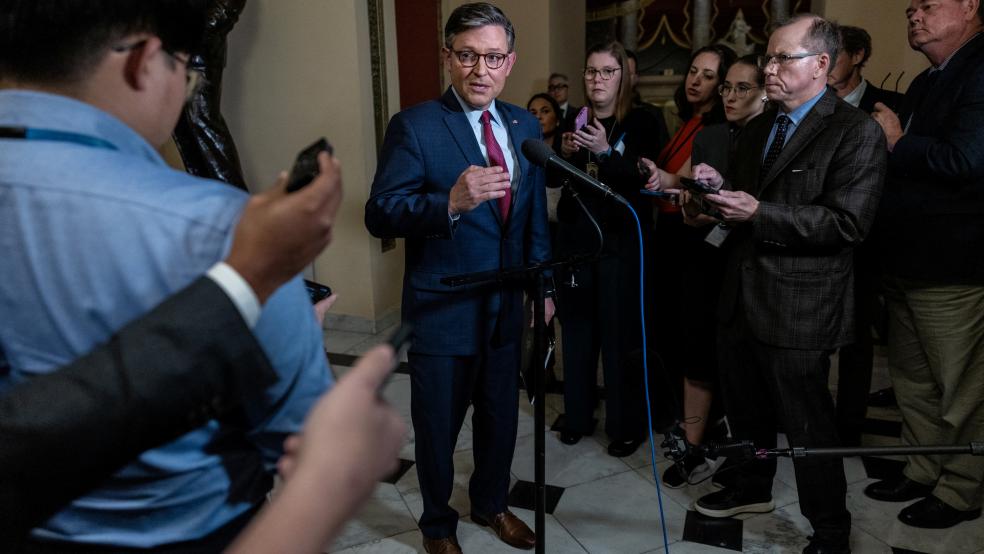Now what? That’s the question after House Speaker Mike Johnson’s plan to avert a government shutdown and enact a controversial voter ID requirement failed to pass Wednesday evening, with 14 Republicans voting against it. Congress now has 11 days to come up with — and pass, a Plan B.
Johnson has not put forth a fallback option; he’s apparently stayed tight-lipped even privately. He told reporters and his leadership team that he’d discussing the options with former President Donald Trump, who has called for Republicans to shut the government down unless the funding package includes their SAVE Act, which requires proof of citizenship from people registering to vote in federal elections. "If Republicans don't get the SAVE Act, and every ounce of it, they should not agree to a Continuing Resolution in any way, shape, or form," Trump posted on his Truth Social site yesterday.
As Johnson works to get his party on the same page, he is now expected to move on to what seemed inevitable all along: a “clean” continuing resolution funding the government into December, which will need to be passed with considerable help from Democrats.
“Many House Republicans — including those tasked with funding the government — increasingly expect that he’ll soon greenlight that plan,” Politico reports. “That prediction is also shared by House Democrats and multiple senators.”
But with Johnson’s next steps unclear for the moment, Democratic Senate Majority Leader Chuck Schumer on Thursday began preparations for the Senate to move ahead with its own continuing resolution, filing cloture on the legislative vehicle for the stopgap spending fix.
“Instead of doing the bipartisan work everyone knows is required for avoiding a shutdown, the House Republican leadership has wasted two weeks — two weeks — listening to Donald Trump’s ridiculous claims on the campaign trail,” Schumer said on the Senate floor. “Now that their efforts have failed, House Republicans don’t seem to have any plan for actually keeping the government open. So, the Senate will step in.”
Schumer said that Johnson now must choose between “blind obeisance” to Trump or a bipartisan deal to avoid a shutdown. And he added another swipe at the former president, asking: “How does anyone expect Donald Trump to be a president when he has such little understanding of the legislative process? He's daring the Congress to shut down. I remember he did that with Speaker Pelosi and I in his office a while back. It didn't work out too well for him. Our Republican colleagues should not blindly follow Donald Trump. He doesn't know what he's doing.”
The Senate could still allow the House to act first, but Schumer said his move allows “maximum flexibility” as the two sides try to figure out how to keep the government open. Key appropriators have already signaled that bipartisan talks have begun or are about to get underway.
Even as Johnson now must look for a new path forward, he has continued to defend his strategy, including in an interview last night with Fox News’s Sean Hannity. “The play that we ran tonight was the right play. It was the right fight for the American people. It’s the one they demand and deserve,” he said, adding, “I’m very disappointed it didn’t pass. We ran the right play. We came a little bit short of the goal line. So now we go back to the playbook, we’ll draw it up. We’re already hearing good ideas from our members, and we’ve got time to fix this, and we’ll get it done.”
Hannity sounded a bit incredulous. “You keep saying it’s the right play, and you can’t get every Republican to vote for it. That’s your own party.”
The bottom line: Despite pressure from Trump, Johnson is likely going to have to rely on Democrats to avoid a government shutdown that would hurt Republican candidates in key election contests. The deadline is at the end of the month, but a House vote on a shorter-term funding patch reportedly could come next week, allowing members to then leave town until after the elections. Both parties will still have to decide whether to include disaster aid, additional Secret Service funding or any other provisions as part of the deal.





